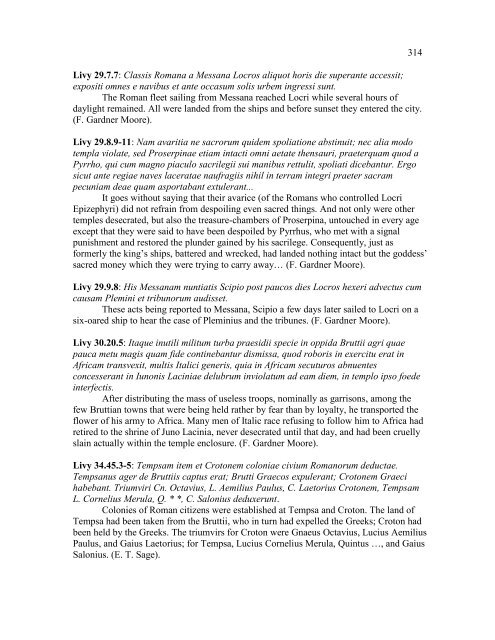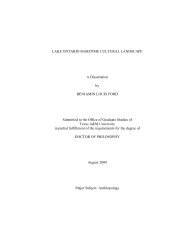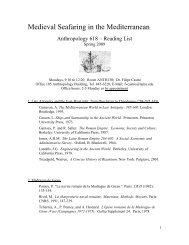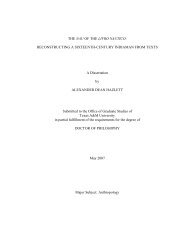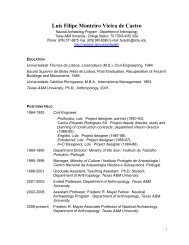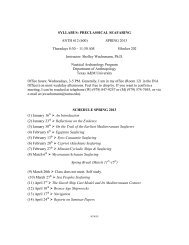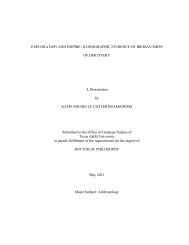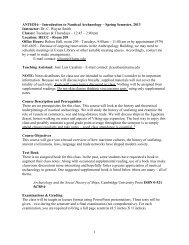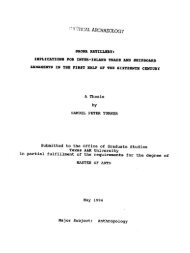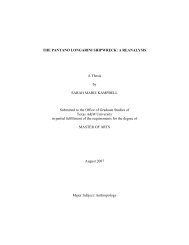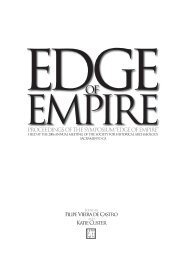- Page 1 and 2:
MARBLE TRASPORT I THE TIME OF THE S
- Page 3 and 4:
ABSTRACT Marble Tranport in the Tim
- Page 5 and 6:
To Cesare and Gabriella Bartoli, fo
- Page 7 and 8:
I am deeply indebted to Dr. Deborah
- Page 9 and 10:
Artifacts: ABA Attic base BLC Block
- Page 11 and 12:
Page The 2006 Mapping Season.......
- Page 13 and 14:
LIST OF FIGURES Figure 1 Southern I
- Page 15 and 16:
Page Figure 29 Three-dimensional di
- Page 17 and 18:
LIST OF TABLES Table 1 Coordinates
- Page 19 and 20:
CHAPTER I ITRODUCTIO The research t
- Page 21 and 22:
to Tarentum. After locating these a
- Page 25:
the Peloponnese, which sailors had
- Page 28:
Calabria is 240 km long and reaches
- Page 31:
It is, therefore, easy to understan
- Page 34:
territory. These peaks would also h
- Page 37 and 38:
The relevance of the mountains gain
- Page 39 and 40:
Pseudo-Scylax, an anonymous geograp
- Page 41:
the castle but the sea around the i
- Page 44 and 45:
happens in the city of Egripos (mod
- Page 46 and 47:
e trusted. 41 Their legends explain
- Page 48 and 49:
Croton who discovered three of the
- Page 50:
or, thereafter, Roman Copia, flouri
- Page 54 and 55:
The Scirocco Wind and the Final Mom
- Page 56 and 57:
(Drawing: D. Bartoli).
- Page 58 and 59:
ancient settlements and ports locat
- Page 60 and 61:
The Punta Scifo A Shipwreck and Its
- Page 62 and 63:
Roman inscriptions on two of the th
- Page 64 and 65:
marble table, along with fragments
- Page 66 and 67:
and curiously some of the blocks an
- Page 69 and 70:
Fig. 20. The catamaran Juno at work
- Page 71:
The rocky spots close to the coastl
- Page 74 and 75:
Fig. 23. The launch used to reach t
- Page 76:
Results of the Studies The Punta Sc
- Page 79 and 80:
Item # Block/Slab Length (m) Table
- Page 81 and 82:
Item # Block/Slab Length (m) Table
- Page 83:
cargo was probably intended to prov
- Page 86 and 87:
of which was capped at 100 denarii
- Page 88 and 89:
Table 5. (continued). Tons Volume (
- Page 90 and 91:
Based on the available data, the ca
- Page 92:
CHAPTER III THE PUTA SCIFO A (“PA
- Page 95 and 96:
five more labra, two pedestals, and
- Page 97 and 98:
A small portion of the bottom of th
- Page 99 and 100:
ecovery efforts at the beginning of
- Page 101 and 102:
Table 7. Catalog of marble artifact
- Page 103 and 104:
Table 7 (continued). Current Locati
- Page 105 and 106:
Table 7 (continued). Current Locati
- Page 107 and 108:
Table 7 (continued). Current Locati
- Page 109 and 110:
Table 7 (continued). Current Locati
- Page 111 and 112:
Column Shafts The Marble Elements f
- Page 113 and 114:
shafts quarried throughout the Roma
- Page 115 and 116:
superimposed columns is the basilic
- Page 117 and 118:
to their diameters. 126 As is shown
- Page 119 and 120:
This has been interpreted as: Loc(o
- Page 121 and 122:
administrative center in Synnada, b
- Page 123 and 124:
Marble Blocks At the time of its di
- Page 125 and 126:
pavonazzetto have squared or rectan
- Page 127 and 128:
Marble Basins (Labra) on-Architectu
- Page 129 and 130:
Table 12 shows the dimensions, both
- Page 132 and 133:
Pedestals Decorated with Lions’ P
- Page 134 and 135:
Table 13. Dimensions of the marble
- Page 136 and 137:
Stands Decorated with Lions’ Paws
- Page 138:
Fig. 37. Greek relief of the sixth
- Page 142 and 143:
Statue Pedestal # Table 17 (continu
- Page 144:
Fig. 43. Marks left from a statue
- Page 147 and 148:
trapezophoros, a vertical support f
- Page 149 and 150:
Fig. 45. (a) To the left a statue o
- Page 151 and 152:
In Sicily, A. J. Parker and D. M. S
- Page 153 and 154:
Bronze Ladles, Candelabrum, Lead De
- Page 155 and 156:
Conclusions Like all ancient shipwr
- Page 157 and 158:
CHAPTER IV THE PUTA SCIFO A SHIPWRE
- Page 159 and 160:
Empire’s most prominent cities. T
- Page 161 and 162:
Eastern materials with the modesty
- Page 163 and 164:
its ruling families could be preser
- Page 165 and 166:
concentrated his efforts on the eff
- Page 167 and 168:
vast quantities of marble, and Rome
- Page 169 and 170:
to open new quarries, hoping the in
- Page 171 and 172:
Palatine, and the Thermae Antoninia
- Page 173 and 174:
The Punta Scifo A shipwreck adds in
- Page 175 and 176:
157 made them white elephants; too
- Page 177 and 178:
oard among amphoras, kitchen cerami
- Page 179 and 180:
Table 18 (continued). Publication T
- Page 181:
Table 18 (continued). Publication T
- Page 184 and 185:
Table 20. Percentages of shipwrecke
- Page 186 and 187:
Table 22. Tonnage of known marble c
- Page 188:
with the major state-owned producti
- Page 191 and 192:
One characteristic that sets Procon
- Page 193 and 194:
175 Synnadic, or Phrygian, which re
- Page 196 and 197:
Sangarius River is at present a lit
- Page 198 and 199:
CHAPTER V SUMMARY AD FIAL COCLUSIOS
- Page 200 and 201:
uilding project, lead me to propose
- Page 202 and 203:
WORKS CITED Adam, R. 1990. Classica
- Page 204 and 205:
edited by M. Waelkens and Norman He
- Page 206 and 207:
Corcoran, S., and J. DeLaine. "The
- Page 208 and 209:
_______. 1989b. Cavum Antrum Phrygi
- Page 210 and 211:
___________. 1992. "Exportation of
- Page 212 and 213:
_________ and S. Festuccia. 1995. "
- Page 214 and 215:
Peacock, D. P. S., and D. F. Willia
- Page 216 and 217:
Richter, G.M.A. 1966. "The Furnitur
- Page 218 and 219:
Spagnoli, E. 2002. "Bolli in Piombo
- Page 220:
White, K.D. 1984. Greek and Roman T
- Page 223 and 224:
LAB 3. Labrum. Present location: Ar
- Page 225 and 226:
LAB 5. Labrum. Present location: Na
- Page 227 and 228:
LAB 7. Labrum. Present location: Ca
- Page 229 and 230:
211
- Page 231 and 232:
213
- Page 233 and 234:
215
- Page 235 and 236:
HPL 5. High pedestal stand with lio
- Page 237 and 238:
MPL 1. Medium pedestal stand with l
- Page 239 and 240:
MPL 2. Medium pedestal stand with l
- Page 241 and 242:
LPL 1. Low pedestal stand with lion
- Page 243 and 244:
LPL 2. Low pedestal stand with lion
- Page 245 and 246:
COL 1. Column shaft. Present locati
- Page 247 and 248:
COL 2. Column shaft. Present locati
- Page 249 and 250:
COL 3B. Column shaft, fragment. Pre
- Page 251 and 252:
COL 3B COL 4 COL 3C 233
- Page 253 and 254:
COL 6. Column shaft. Present locati
- Page 255 and 256:
STP 2. Statue Pedestal. Present loc
- Page 257 and 258:
STP 3. Statue Pedestal. Present loc
- Page 259 and 260:
241
- Page 261 and 262:
STP 5. Statue Pedestal. Present loc
- Page 263 and 264:
245
- Page 265 and 266:
247
- Page 267 and 268:
249
- Page 269 and 270:
BLC 4. Block. Present location: Cap
- Page 271 and 272:
BLC 6. Block. Present location: Las
- Page 273 and 274:
BLC 8 Present location: Corazzo Des
- Page 275 and 276:
BLC 10. Block. Present location: Se
- Page 277 and 278:
BLC 12. Block. Present location: Se
- Page 279 and 280:
STA 1. Statuette of Eros and Psyche
- Page 281 and 282: SLB 1. Marble slab. Present locatio
- Page 283 and 284: ABA 2. Attic Base. Present location
- Page 285 and 286: 267
- Page 287 and 288: ABA 5. Attic Base. Present location
- Page 289 and 290: ICA 2. Ionic Capital. Present locat
- Page 291 and 292: MOB 1. Mobile artifacts. (Coticulae
- Page 293 and 294: MOB 3. Mobile artifact. (Amphora).
- Page 295 and 296: MOB 4. Mobile artifact. (Amphora).
- Page 297 and 298: MOB 5. Mobile artifact. (Amphora).
- Page 299 and 300: MOB 6. Mobile artifacts. (Pitchers/
- Page 301 and 302: MOB 7. Mobile artifacts. (Bronze la
- Page 303 and 304: MOB 8. Mobile artifact. (Bronze can
- Page 305 and 306: MOB 9. Mobile artifact. (Lead statu
- Page 307 and 308: APPEDIX 2 TRASCRIPTIOS OF THE ORIGI
- Page 309 and 310: [May 2, 1915]. English Translation.
- Page 311 and 312: [3 maggio 1915]. Copia = L’anno m
- Page 313 and 314: [15 maggio 1915]. R. SOPRITEDEZA AR
- Page 315 and 316: [May 15, 1915]. English Translation
- Page 317 and 318: These are the results of my mission
- Page 319 and 320: Nel foglio M presento il disegno di
- Page 321 and 322: I show on sheet M the drawing of on
- Page 323 and 324: Circus Maximus, the other in the Ca
- Page 325 and 326: Cic. Brut. 85: Memoria teneo Smyrna
- Page 327 and 328: Myscellus, an Achaean by birth, wen
- Page 329 and 330: 311 ajgora;n para; tw`n Krotwviatw`
- Page 331: Livy, 24.3.6: Magni igitur fructus
- Page 335 and 336: stabatque sibi non segnis achates /
- Page 337 and 338: the former kings of Bithynia, thoug
- Page 339 and 340: 321 Plin. H 24.23.37: Spissarum uti
- Page 341 and 342: of the emperor, so to contribute to
- Page 343 and 344: 325 The whole march from New Cartha
- Page 345 and 346: Suet. Aug. 28: Urbem neque pro maie
- Page 347 and 348: the territory of Thuria. And when t
- Page 349 and 350: Verg. G. 3.219: Pascitur in magna S
- Page 351 and 352: widely used in Byzantium made the l
- Page 353 and 354: APPEDIX 5 ROMA QUARRY ISCRIPTIOS Ro
- Page 355 and 356: • CAES(ura) followed by the name


